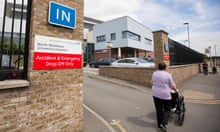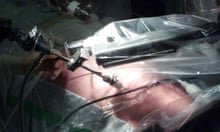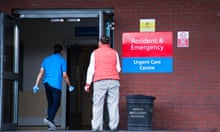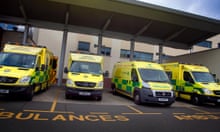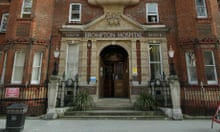Young heart patients who were treated at a Bristol hospital were “put at risk of harm” because of staff shortages and a lack of skills, a major review has concluded.
More than 200 families contacted the review, which the NHS ordered after some parents expressed concern that their children may have died unnecessarily following treatment at the Bristol Royal hospital for children.
The so-called Bristol review, published on Thursday, makes 32 recommendations on issues ranging from staffing levels to the way medical staff communicate with families. It also calls for NHS England to undertake a nationwide review of paediatric intensive care units (PICU), claiming they have capacity problems.
Some of the parents who called for the review said it did not go far enough. Yolanda Turner, whose son Sean died aged four after being treated on ward 32, which is at the centre of the concerns, said not all her questions had been answered. She told the Guardian: “It was a nightmare week on that ward. It was frightening watching your child die and not being able to do anything about it.”
Sean’s parents believe their son was transferred too quickly to ward 32 from intensive care following a heart operation. They say he was so desperate for a glass of water that he resorted to sucking the moisture from tissues used to cool his forehead. “He needed specialist care, it wasn’t there,” said Ms Turner. “We don’t feel the report goes far enough. We’re not sure they have looked deeply enough into it.”
Bristol was at the centre of a scandal in the 1990s when it emerged that too many babies were dying following heart procedures at the city’s Royal Infirmary. An inquiry concluded in 2001 that up to 35 children under the age of one need not have died.
Fifteen years on, the new review focuses largely on ward 32 at the children’s hospital, where children were cared for following heart operations. The chair of the review, Eleanor Grey QC, said some parents were let down.
She said: “Ward 32 in the period from 2010 to 2012 was routinely under strain. We judged the nursing numbers would have fallen below the recommended levels on a reasonably frequent basis and there were gaps in the specialist skills. We felt children were put at risk of harm.”
One mother told the review team that she was promised her child would be seen every 15-30 minutes following an operation. But after her child was moved to ward 32, he was not checked for more than three hours.
Another family said staff were “uncaring and inconsiderate”, while some parents suggested the ward was dirty and staff would “clean around” you.
One outreach nurse reported the pressure they were under. “From the start of the shift it was very difficult to provide a safe and satisfactory standard of care. Not all patients who required hourly observations had these carried out and some of the basic care needs were not met, such as the changing of a patient’s nappy when this was waiting to be done,” the nurse said.
Grey, who was counsel to the previous Bristol inquiry, said the “shadow” of that scandal continued to hang over cardiac services in the city and contributed to an atmosphere of mistrust.
She called for one of the recommendations from the inquiry in 2001 that was not adopted – for discussions between medics and families to be routinely recorded – to be introduced now.
“Most families have mobile phones readily able to record conversations. We think it’s time there should be an open dialogue about this, offering families an opportunity to do that,” she said.
Calling for a national review of PICU, Grey said: “The service suffered from capacity problems. It’s a complex national problem. It’s not just about how many beds you have but the specialist nurses and skills needed to care for them.”
However, the review did not conclude that more young heart patients had been dying at Bristol, reporting that mortality rates were “broadly comparable” to those at other centres.
Solicitor Laurence Vick, who has represented families of children who have died at Bristol since the 1990s, said: “I think one failing I see time and again is that parents struggle for information. I don’t think much has changed there. They couldn’t get straight answers back in the 90s. They can’t now.”
The chief executive of University Hospitals Bristol NHS foundation trust, Robert Woolley, said: “We fully accept the findings of these reports and welcome their publication as a way to learn from mistakes.
“We are deeply sorry for the things we got wrong – for when our care fell below acceptable standards, for not supporting some families as well as we could have and for not always learning adequately from our mistakes.
“This undoubtedly added to the distress of families at an already very upsetting time for them.
“We didn’t get it right for these families, and I’d like to apologise to the families unreservedly, on behalf of everyone at the trust.”
NHS England promised to take action to ensure a consistent level of care is available for every patient in every part of the country. Next week it will announce the practical steps it is taking.

